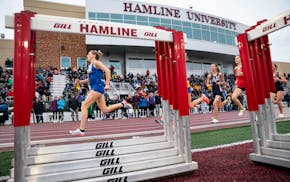The Minneapolis DFL Party will move forward with virtual endorsements this year, even though Mayor Jacob Frey and 20 other candidates said they had concerns about the format and felt time would be better spent building consensus among party members.
"Endorsements borne of this process will be viewed as illegitimate by many campaigns and observers, and they threaten to undermine the integrity of our great Democratic-Farmer-Labor Party," wrote the group, which included Frey and City Council members Kevin Reich, Jamal Osman, Lisa Goodman and Linea Palmisano, as well as political newcomers.
In meetings this week, some other DFL members argued that the new process was necessary amid the coronavirus pandemic and could make it easier for some people to participate. On Tuesday night, Minneapolis DFL leaders voted to move forward with the virtual endorsements.
Minneapolis DFL Chairman Devin Hogan said during the meeting that he didn't appreciate being told that the endorsement process is divisive.
"It's us coming together as Democrats to say, 'We agree that these people meet our values as Democrats,' " he said.
The DFL has long dominated city politics, but arguments over how to change policing following George Floyd's death have highlighted divisions within the local party and attracted national attention and campaign spending.
That adds a new dynamic to this November's race, when the mayor's office, all 13 City Council seats and spots on the Board of Estimate and Taxation and Park and Recreation Board are all up for election.
Candidates who win the endorsement are typically able to share resources, giving them access to a larger pool of volunteers and the ability to share costs of campaign fliers, among other efforts aimed at boosting their campaigns.
It's too early to tell how many people will enter the races — paperwork declaring candidacy doesn't need to be filed until late in the summer — but early estimates have nearly 60 people considering campaigns.
In an interview Tuesday, Palmisano said the group fears the virtual endorsement process won't be accessible to many residents and that it will cause further tensions as the city awaits the outcome of the trial of Derek Chauvin, the former Minneapolis police officer charged with killing Floyd.
"I think what we're scared of is how this all could get quickly corrupted by people who have the most outside money coming in," she said. "The beauty of a caucus is about it being really grassroots, and that's not … what these other influences are trying to accomplish."
Council Member Phillipe Cunningham, meanwhile, said he has been hearing from people who think moving the meetings online will make it easier for them to follow city politics.
"I would actually say that it provides us with the opportunity to expand the participation base," Cunningham said.
The DFL endorsement process typically unfolds over a series of weeks, with multiple in-person meetings that sometimes run late into the night as people discuss which candidates to support. This year, because of the pandemic, meetings will happen online.
The process typically begins with people meeting with others in their precincts and selecting delegates, who then go on to ward- or city-level conventions and vote on whom the party should endorse.
In an interview earlier in the day, Hogan defended the new process but said feedback is welcome. While some events could overlap with the Chauvin trial, Hogan said the final endorsement decisions will come in June.
To move the process online, the Minneapolis DFL needed permission from the state party, whose leaders met Monday night.
Ken Martin, chairman of the state DFL, said he has confidence in the plan that Minneapolis leaders have pitched and believes that robust discussion within the party is healthy.
Liz Navratil • 612-673-4994

The Hamline Elite Meet, already in rare air, presents a co-ed look
Minneapolis to set up Lake Street Community Safety Center, and wants residents' help to define it
Searching for Snoopy: What happened to all the 'Peanuts' statues in St. Paul?
North Oaks withdraws request for density exemption from Met Council

